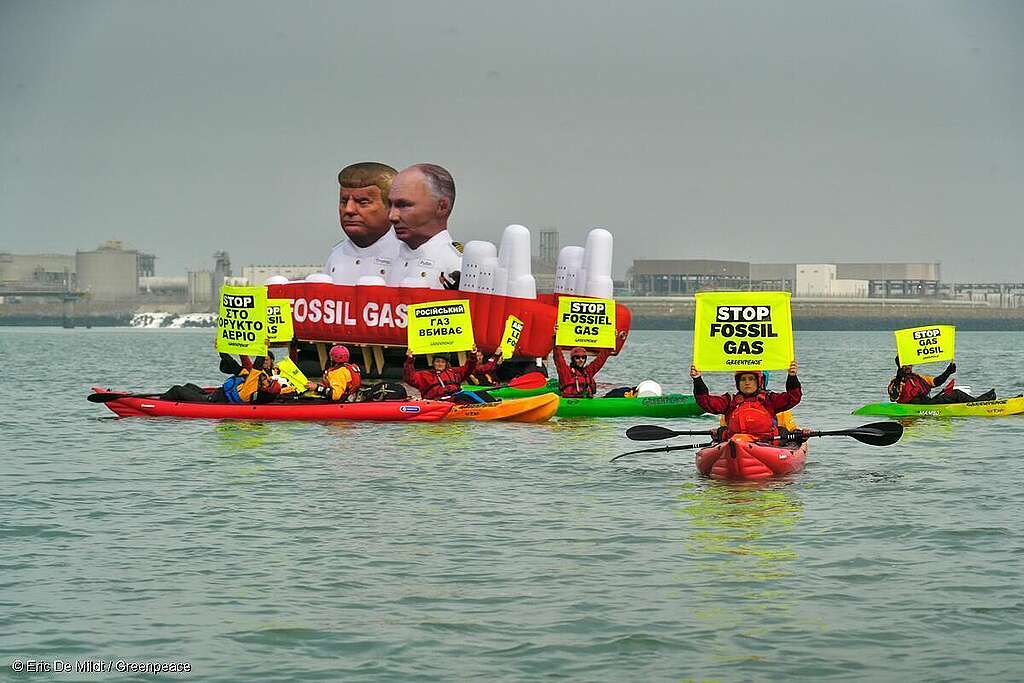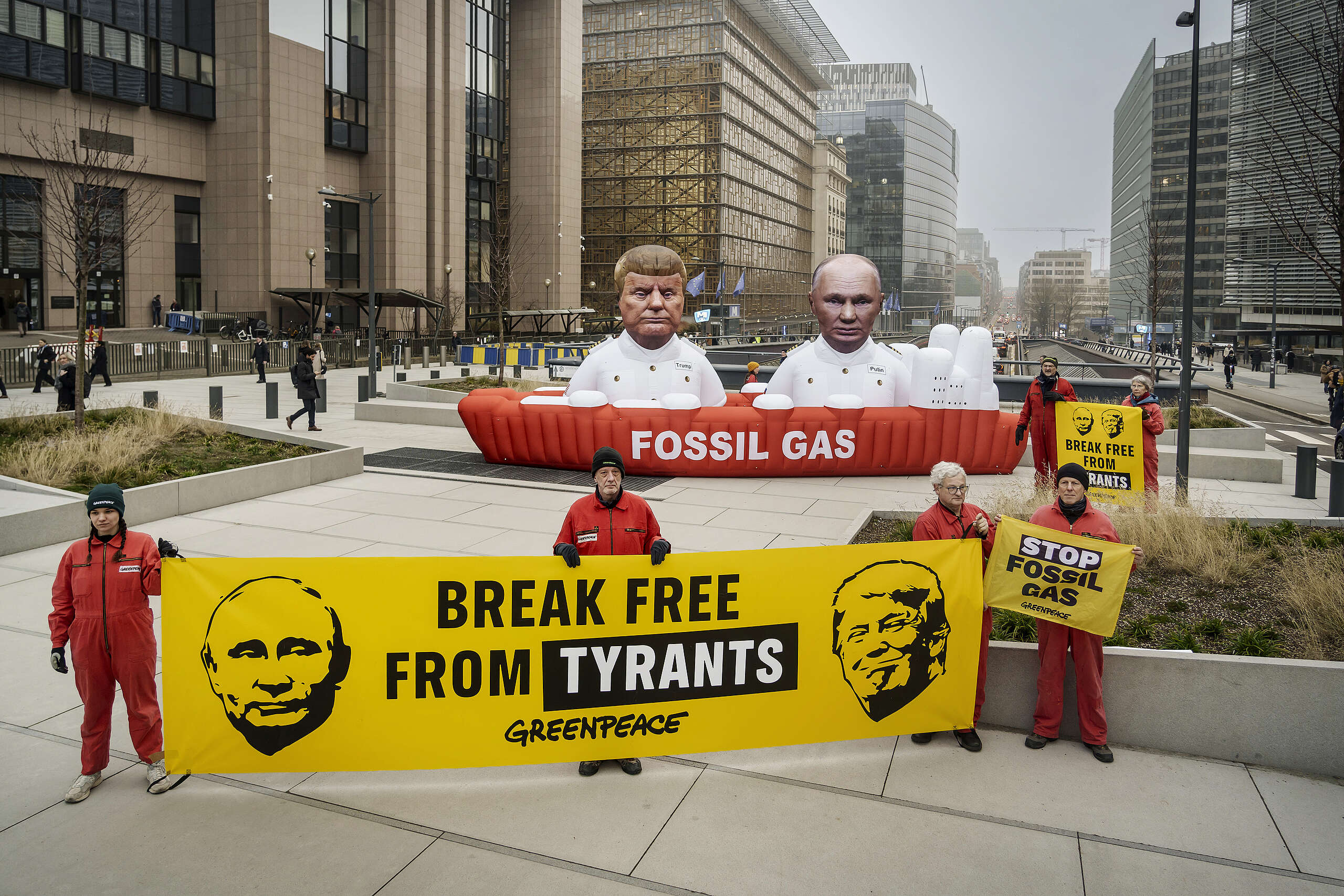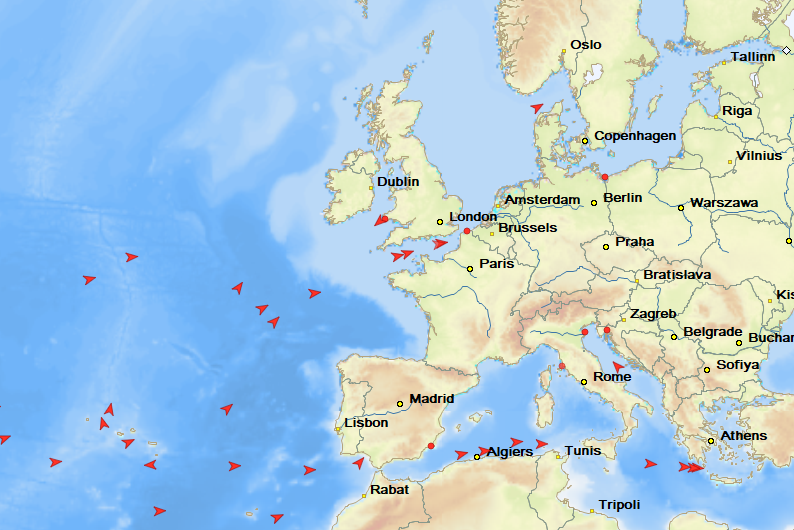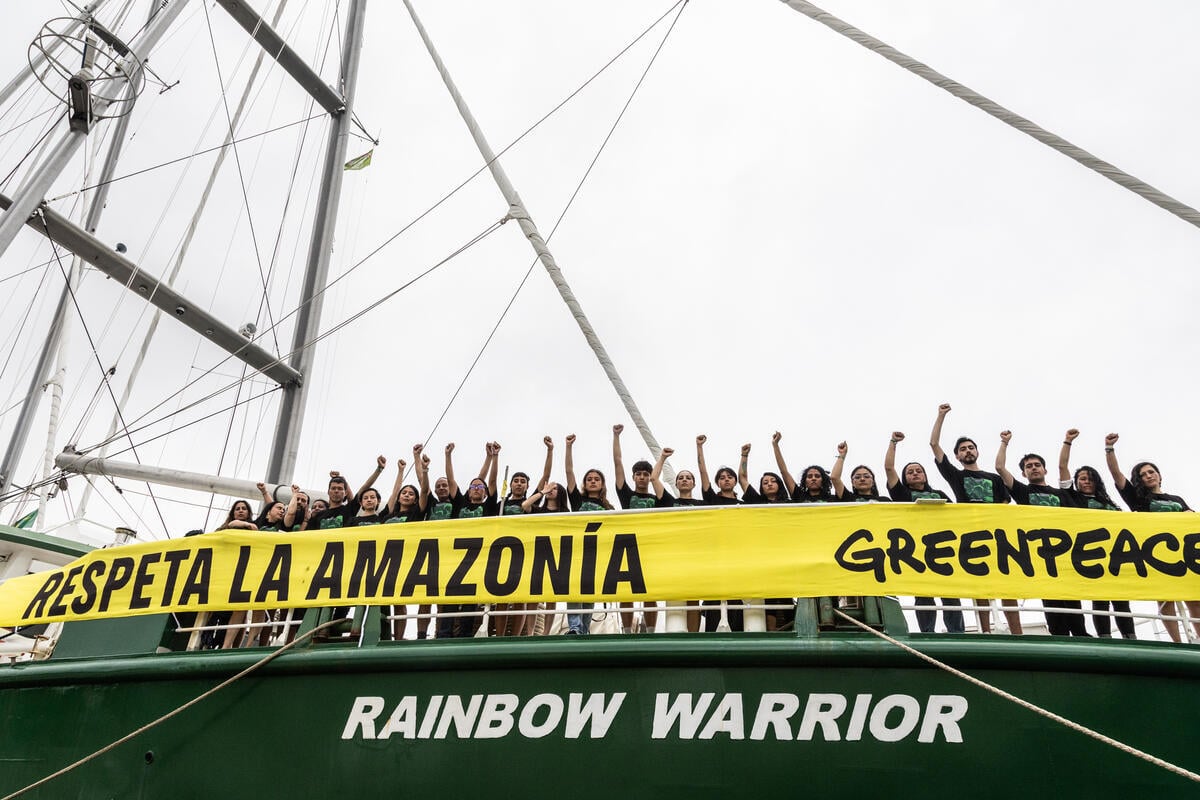Zeebrugge, Belgium – More than 70 activists from 17 countries have joined Greenpeace Belgium in blockading the Zeebrugge liquified gas terminal, in protest of Europe’s dependence on gas imports from the US and Russia. As the EU discusses new sanctions against Russia and Trump keeps pushing the EU to buy more US gas, Greenpeace urges EU leaders to cut dependencies by phasing out fossil gas completely, and accelerating the transition to renewable energy.

The Zeebrugge gas terminal is the largest entry point for Russian liquified gas into the EU, and its imports of US gas continue to rise.[1] This protest takes place as the EU discusses its 19th sanctions package on Russia, including a proposal by the EU Commission to ban Russian liquified gas imports as of January 2027, and EU heads-of-state are meeting in Copenhagen to discuss the bloc’s security – in the context of Russia’s recent airspace violations.[2]
Photos and videos are available in the Greenpeace Media Library.
At the entrance of the terminal, activists installed a 10-metre-long inflatable structure, portraying Vladimir Putin and Donald Trump on a gas tanker. Next to it, Greenpeace’s sailing boat the Witness displays a banner reading “They love gas, you pay the price. Stop Fossil Gas”, as activists in 44 kayaks block the way into the terminal.[3]
From the blockade, Lisa Göldner, fossil fuel campaigner from Greenpeace Germany, said: “The EU’s reliance on Russian gas is funding the war in Ukraine and jeopardising peace and security in Europe. Gas imports from Russia must end now. But replacing Russian gas with fracked gas from the US keeps Europe trapped in dangerous dependencies. We are here today because accelerating the transition to renewable energy is no longer just an environmental imperative; it is a matter of security. The EU must break free from its fossil fuel dependency and take control of its future. This means investing in a secure and independent energy system based on 100% renewable energies and cutting energy waste.”
In a new report, Greenpeace Belgium calculates that between 2022 and 2024, the Russian company Yamal LNG, largest exporter of Russian gas to Europe, earned an estimated US$40 billion, and paid an estimated US$9.5 billion in profit tax to the Russian state.[4] An amount that the Russian state could use to buy 271,000 Shahed-type attack drones according to Greenpeace Belgium’s calculations – in March 2025, an estimated 1,000 Shahed drones were used to attack Ukraine each week. Many Europe-based companies have signed supply contracts with Yamal LNG and indirectly contributed billions to the Russian state budget between 2022 and 2024. Among them, TotalEnergies (estimated US$2.5 billion in profit tax), SEFE (US$1.45 billion) and Naturgy (US$1.25 billion) contributed significantly, according to the same report.
The report also highlights that from 2022 to June 2025, France, Spain, Belgium and the Netherlands spent more on liquified gas imports from Russia (€34.3 billion) than they provided in bilateral aid to Ukraine (€21.2 billion) over the same timeframe.
Greenpeace Belgium is calling on the EU and national governments to ban Russian liquified gas as part of their 19th sanctions package, with the aim of ending Russian gas imports completely. At the same time, they must halt new supply contracts for liquefied gas from the US and commit to a fossil gas phase-out by 2035.
Photos and videos are available in the Greenpeace Media Library.
Notes:
This action is the final stop of Greenpeace’s ‘Stop Fossil Gas’ expedition across Europe aboard the Greenpeace ships Arctic Sunrise and Witness. The ships have visited Spain, Belgium, Italy, Croatia, Greece, Denmark and Germany to spark debate about Europe’s energy system; question its dependence on fossil gas; and promote a just and fair phase-out of fossil gas – through a transition to renewable energy that allows everyone to meet their energy needs at a decent price, without harming people, the planet or the environment. Greenpeace International’s Open Letter to the EU and national governments calling for a ban on all new fossil fuel infrastructure projects and to a phase-out of gas by 2035 has already been signed by 85,000 people.
[1] According to data gathered by Greenpeace Belgium through Refinitiv tanker tracking. In addition, the EU recently pledged to purchase $750 billion worth of energy from the US over the next three years, including liquefied fracked gas, as a means to appease Trump’s threats of increasing import tariffs on EU goods.
[2] Invitation letter by President António Costa to the members of the European Council ahead of their informal meeting in Copenhagen on 1 October 2025.
[3] Activists from Austria, Belgium, Bulgaria, Croatia, Denmark, Finland, France, Germany, Greece, Hungary, Italy, the Netherlands, Poland, Romania, Spain, Sweden and Ukraine take part in the ongoing action.
[4] The LNG trap: Europe’s Fossil Gas Dependence on Russia and the United States, Greenpeace Belgium, September 2025.
Contacts:
Manon Laudy, press officer for Greenpeace’s European campaign against fossil fuels, Greenpeace Netherlands, +33 6 49 15 69 83, [email protected]
Greenpeace International Press Desk, +31 (0)20 718 2470 (available 24 hours), [email protected]



